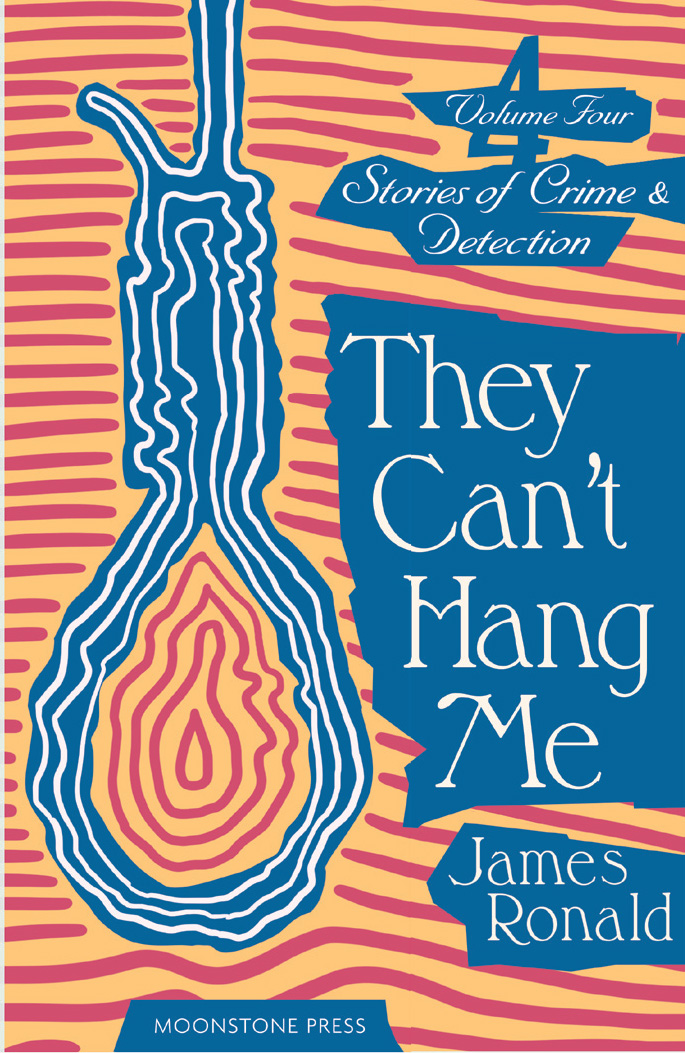They Can’t Hang Me
‘I shall kill you, one by one, and I’ll get away with it.’
Stories of Crime & Detection Volume Four contains a novel and three short stories:
They Can’t Hang Me Lucius Marplay has spent twenty years hidden away in an asylum, making countless threats against the four men who took over The Echo, the London newspaper he once owned. A visit from an old friend gives Marplay the chance to escape, and soon he begins a scheme of revenge. His daughter Joan tries to track him down but is unsuccessful. As the four newspaper men begin to die one by one, can anyone catch this clever murderer, a man capable of vanishing into thin air? They Can’t Hang Me was adapted into the movie The Witness Vanishes (1939).
The Man Who Came Back An escaped convict has a minor road accident and the unexpected happens.
Accident An accidental death leads Daphne and Peter to act rashly.
Out of the Fog A short story set during Prohibition in the U.S.
JAMES JACK RONALD (1905-1972) was a prolific writer of pulp fiction, mystery stories and dramatic novels. Raised in Glasgow, Ronald moved to Chicago aged seventeen to ‘earn his fortune’, later returning to the UK to pursue a writing career. His early works were serializations and short stories syndicated in newspapers and magazines around the world. Ronald wrote under a number of pseudonyms, including Michael Crombie, Kirk Wales, Peter Gale, Mark Ellison and Kenneth Streeter among others. Several books were adapted into films, including Murder in the Family (1938) and The Suspect (1944).
£10.99
By James Ronald
Introduction by Chris Verner
First published in 1930s by Rich and Cowan and others.
Paperback
290pp
ISBN 9781899000722
eISBN 9781899000739
Available April 2024
Only logged in customers who have purchased this product may leave a review.
Above the treetops the spire of the village church tapered to a cloudless sky. On a lawn three centuries old, smooth as a carpet, figures in white were playing tennis, darting and leaping as though their bodies were made of fine springs.
On the terrace of the rose-brick manor house two old gentlemen sat in canvas chairs watching the play with wistful eyes. One of them sighed and reached for a decanter which stood on a table between them.
“Not too much soda in mine, Sir Charles,” murmured his companion sleepily. He listened for the swish of the syphon and raised a warning hand when he heard it. “That’s enough. Don’t drown it.”
Sir Charles poured a second whiskey-and-soda and settled back in his chair to enjoy it. “That’s Featherstone’s boy playing
on the second court. Livin’ image of his father.”
“Poor old Feathers! Sad end, eh?”
“Damned sad. Makes you think when you hear of old friends poppin’ off right and left. Not many of us left, eh?”
“Dashed few,” said the other old gentleman sadly, shaking his head. “Dashed few. Still,” he mused, sipping his whisky,“there are worse fates than death.”
“Lord, yes. Take what happened to Marplay, for instance.”
“Poor old Lucius Marplay! His was an appalling fate. Heard anything of him lately?”
“Not for years.”
“I suppose he’s still—”
“Yes.”
They heard a patter of feet from behind and the next moment a girl stood between them.
“I’m sorry, Sir Charles,” she gasped, “but I couldn’t help overhearing. You were talking about Lucius Marplay. I want to
know what you meant. What happened to him?”
The old gentlemen rose and Sir Charles took off his ancient panama. He shifted his weight uncomfortably from one foot
to the other.
“I’d no idea you were in the offin’, Joan. Thought you were playin’ tennis.”
“Won’t you please tell me what you meant? Why would you a thousand times rather be dead than in his shoes? Then he isn’t dead?”
“My dear, this is—I don’t know what to say. Hadn’t you better put these questions to your guardian?”
For a moment the girl stood staring from one to the other; and then she was gone. Sir Charles dabbed at his forehead with
a silk handkerchief. “That was an awkward moment.”
“Pretty girl. Who is she?”
“Lucius Marplay’s daughter.”
“Good God!”
“Exactly,” said Sir Charles. “She doesn’t know. She thinks he’s dead.”

Reviews
There are no reviews yet.